Sylvester Stallone’s 90s “comeback” was spearheaded by “Cliffhanger,” kept on going thanks to “Demolition Man,” and survived letdowns like “Judge Dredd” via some critically acclaimed work in James Mangold’s “Cop Land.” Along the way, Sly signed various deals with Universal, the first film of which, DAYLIGHT (116 mins., 1996, PG-13; Kino Lorber), proved to be a middling recycling of ‘70s disaster movies – more or less in line with similar fare like the dueling “volcano films” of the era (the okay “Dante’s Peak,” the less-than-stellar “Volcano”).
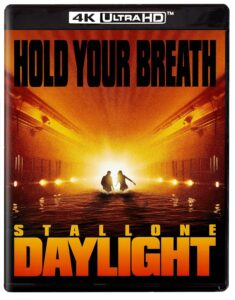 Leslie Bohem’s script lays out a “Poseidon Adventure in the Holland Tunnel” where a careening car crashes into toxic materials, causing an explosion under the Hudson River. Claiming the lives of numerous motorists, the disaster also traps a number of disparate types whose only chance at survival lies with a disgraced emergency services chief (you know who) who manages to convince the authorities in charge that this current cab driver knows how and where to stage a daring rescue attempt. That, of course, he does, but the not-so-thankful survivors provide fewer kudos and more complaints to Stallone once he shows up, including grating-as-hell squabbling couple Jay O. Sanders and Karen Young. The other guests on the ship…wait, survivors in the tunnel…include harried, broke writer Amy Brenneman, an “extreme sports” star (pre-”Lord of the Rings” Viggo Mortensen), Sanders and Young’s camcorder-obsessed daughter (“Halloween IV”’s Danielle Harris), and an elderly couple played by Claire Bloom and Colin Fox.
Leslie Bohem’s script lays out a “Poseidon Adventure in the Holland Tunnel” where a careening car crashes into toxic materials, causing an explosion under the Hudson River. Claiming the lives of numerous motorists, the disaster also traps a number of disparate types whose only chance at survival lies with a disgraced emergency services chief (you know who) who manages to convince the authorities in charge that this current cab driver knows how and where to stage a daring rescue attempt. That, of course, he does, but the not-so-thankful survivors provide fewer kudos and more complaints to Stallone once he shows up, including grating-as-hell squabbling couple Jay O. Sanders and Karen Young. The other guests on the ship…wait, survivors in the tunnel…include harried, broke writer Amy Brenneman, an “extreme sports” star (pre-”Lord of the Rings” Viggo Mortensen), Sanders and Young’s camcorder-obsessed daughter (“Halloween IV”’s Danielle Harris), and an elderly couple played by Claire Bloom and Colin Fox.
Although I found the movie passable years ago, on this viewing, I was disappointed that “Daylight” does pretty much the bare minimum in terms of developing its characters and even Stallone’s predicament. The movie is cut awfully tight and director Rob Cohen proves to be merely serviceable, at best, in establishing the human component of the drama – alas, most characters are thinly-drawn, performed by an ensemble nearly uniform in delivering performances that are several decibels too high, even given the dire circumstances their characters find themselves in. This includes Brennaman, who develops little chemistry with Stallone, and, worst of all, Sanders and Young, who seem to be battling each other for whoever can shout the loudest. They’re impossible to take, and the lack of appealing characters in this movie turns out to be a major issue.
The letdown extends to the movie’s set-pieces, which are competently staged by Cohen, but offer little interest after the movie’s initial blast of ILM-provided special effects. Stallone flies through a number of ventilation fans (each with their own, ridiculous “countdown clock” so viewers are aware how little time he has to accomplish the task) and yells at his crew to get out of the way of rats and rising water, but the movie feels like it’s missing some big set-piece that could’ve put it over the top. Ditto Stallone himself, who feels detached in a quasi “vulnerable” role that ends with him, too, screaming nearly incoherently at the situation he’s in.
“Daylight” was one of Universal’s big Christmas movies in 1996 but didn’t make much noise at the box-office domestically. I assumed it recouped its investment thanks to foreign dollars, yet the movie’s disappointment was just the tip of the iceberg for what turned out to be a busted relationship between Stallone and Universal: the troubled (if underrated) thriller “D-Tox” ended up being sold off in the U.S. and sent straight to video, bombing out completely while the next picture in that contract was never made at all.
Fans of the movie will want to check out Kino Lorber’s 4K UHD (1.85) remaster of the film, at least, thanks to its new 4K scan of the OCN. This is a hugely improved transfer, enhanced with Dolby Vision HDR, that easily trumps the Blu-Ray that Universal released years ago. The movie is more detailed than less grainy than that early format BD (so early, in fact, it was even issued on HD-DVD), with colors and contrasts all being improved as a result.
The 5.1 DTS MA sound is nicely delivered with ample directorial effects and a heavy-handed Randy Edelman score while Kino has reprieved the legacy extras which date back all the way to Universal’s “Signature Collection” laserdisc – these include a Making Of, Cohen commentary, vintage featurette, trailers, and the music video for the David Foster-produced ballad “Whenever There Is Love” featuring Donna Summer and Bruce Roberts.
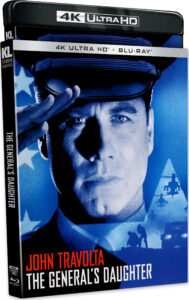 John Travolta’s ‘90s output included the high-profile Paramount release THE GENERAL’S DAUGHTER (116 mins., 1999, R), an adaptation of a book by Nelson DeMille that finds Travolta as a military investigator uncovering a conspiracy at Fort MacCallum after a female officer is murdered.
John Travolta’s ‘90s output included the high-profile Paramount release THE GENERAL’S DAUGHTER (116 mins., 1999, R), an adaptation of a book by Nelson DeMille that finds Travolta as a military investigator uncovering a conspiracy at Fort MacCallum after a female officer is murdered.
“The General’s Daughter” seemingly had it all – a script worked on by William Goldman and a fantastic cast including Madeleine Stowe, James Cromwell, Timothy Hutton and James Woods among them – but the movie is a grind under the direction of Simon West, a veteran of the Bruckheimer school who was coming off “Con Air.” West’s heavy-handed approach doesn’t function well with the sordid source material, playing up disturbing/seedy elements that could’ve been better handled by someone with a lighter hand, and staging many scenes at a raised emotional height that forgoes subtlety and suspense.
Still a profitable movie at the box-office, “The General’s Daughter” receives yet another nice Kino Lorber 4K UHD (2.35, 5.1 DTS MA) presentation with Dolby Vision HDR. Legacy extras include a featurette, deleted scenes, and West’s commentary.
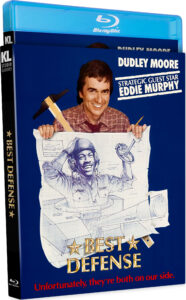 From a disaster movie to horror of the comedic variety, we come to Kino Lorber’s release of the 1984 Dudley Moore vehicle BEST DEFENSE (94 mins., R; Kino Lorber).
From a disaster movie to horror of the comedic variety, we come to Kino Lorber’s release of the 1984 Dudley Moore vehicle BEST DEFENSE (94 mins., R; Kino Lorber).
This forgettable war comedy was one of several mid-’80s releases to deal with crazy military shenanigans, following the busted William Friedkin “satire” “Deal of the Century,” while the likewise-forgettable James Garner-C. Thomas Howell flick “Tank” was this picture’s counterpart from 1984. Separated from that sub-genre, the picture’s most memorable element by far was its unusual credit billing “Strategic Guest Star: Eddie Murphy” above the title.
As you might expect, Murphy’s appearance is fleeting in this Gloria Katz-Willard Huyck production, which signaled both an uneven road ahead for Murphy’s then-blossoming movie career (he cashed this sizable check inbetween “Trading Places” and “Beverly Hills Cop”) while confirming Moore’s downward trend at the box-office. It was also a harbinger of things to come for the filmmakers: “Howard the Duck” would follow just a couple of years later in what would become an even more infamous failure (though, in reality, it’s a much better movie than “Best Defense”).
In Katz and Huyck’s adaptation of a Robert Grossbach novel, Moore plays a government engineer who builds a war machine coveted by the KGB — and is subsequently tested out by Mr. Moneybags in what becomes a glorified extended cameo. Kate Capshaw appears in a thankless part as Moore’s wife along with Helen Shaver – as Moore’s co-worker and peripheral love interest – in a very dated yet watchable comedy that boasts a Mancini-like Patrick Williams score and a few minor laughs during its 94 minute running time.
Jarringly uneven, “Best Defense” jumps between two time frames with the second one, featuring Murphy, cropping up every so often, reminding you he was still in the picture. This lead to a fabricated story, still prominent on Wikipedia, that the movie was shot and completed with Murphy’s role added in after bad test screenings.
Alan Spencer refutes that story in his commentary here, recorded with Justin Humphreys, which also offers a number of terrific anecdotes about the film and the stars. They also attempt to be diplomatic about the professionalism of the cast and crew here, noting most reviews went overboard in their critique of the film, but they’re also on-target in assessing its weird tonal shifts and obvious post-production cuts. No matter how much the “Guest Star” billing was intended to diminish Murphy’s involvement, audiences expected more of a teaming between Moore and Murphy as it was sold – yet they don’t share so much as a single scene together in a busted Paramount comedy from the summer of ‘84.
Kino Lorber’s Blu-Ray offers another strong Paramount remaster, a 4K scan (1.85) of the OCN featuring precise detail and nice color, with the trailer and the movie’s original mono soundtrack on-hand.
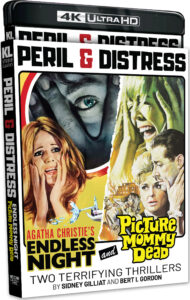 PERIL & DISTRESS: Endless Night/Picture Mommy Dead 4K UHD (Kino Lorber): Double-feature pairing of two late ‘60s/early ‘70s thrillers on a single UHD from Kino Lorber features fine detail and clear mono sound for both movies.
PERIL & DISTRESS: Endless Night/Picture Mommy Dead 4K UHD (Kino Lorber): Double-feature pairing of two late ‘60s/early ‘70s thrillers on a single UHD from Kino Lorber features fine detail and clear mono sound for both movies.
The two pictures are quite different in their pedigree as well: ENDLESS NIGHT (99 mins., 1972) is by far the more entertaining of the duo: an Agatha Christie tale of a psychotic up-and-coming young man (Hywel Bennett) who marries an heiress (Hayley Mills) in a British production from Sidney Gilliat, punctuated by a fine Bernard Herrmann score. The movie is dated but satisfying, even with Bennett becoming increasingly unhinged (both his character and performance).
Kino has paired “Endless Night” with a Burt I. Gordon programmer, PICTURE MOMMY DEAD (82 mins., 1966), a family drama about an inheritance scam being perpetrated by the new wife (Martha Hyer) of Don Ameche, who wants to off Ameche’s daughter (Susan Gordon, Burt’s offspring). This is formulaic and bland but high-brow by Gordon’s typical schlock standards, and both this and “Endless Night” are presented in SDR 4K transfers (each 1.85) with mono sound. Extras include commentaries by Howard S. Berger and Nathaniel Thompson on both movies, carried over from Kino’s earlier Blu-Ray releases.
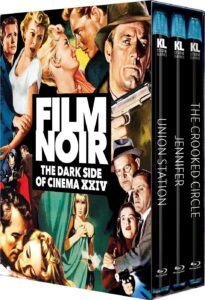 FILM NOIR: THE DARK SIDE OF CINEMA XXIV Blu-Ray (Kino Lorber): The latest Blu-Ray anthology from Kino Lorber includes a trio of Paramount-licensed titles.
FILM NOIR: THE DARK SIDE OF CINEMA XXIV Blu-Ray (Kino Lorber): The latest Blu-Ray anthology from Kino Lorber includes a trio of Paramount-licensed titles.
William Holden stars in UNION STATION (80 mins., 1950), playing a railroad police chief trying to retrieve a blind heiress from kidnappers hoping to extract a ransom. Rudolph Mate directed this taut and exciting Paramount release that’s the best of the batch in Volume XXIV. Also on-tap here is JENNIFER (73 mins., 1953), a moody mystery starring Ida Lupino as a housekeeper in a mansion where her predecessor had disappeared. The textured B&W cinematography of James Wong Howe is the standout in an ultimately disappointing Allied Artists production from director Joel Newton, scored by Ernest Gold (and featuring the soon-to-be-standard “Angel Eyes”). Lastly, the sport of boxing and the shady underworld collide in THE CROOKED CIRCLE (72 mins., 1957), a Republic release shot in the “Naturama” widescreen process with John Smith and Fay Spain.
All three movies include B&W 4K scans with new historian commentaries on each: Alan K. Rode on “Union Station”; Kat Ellinger and Martyn Conterio on “Jennifer”; and Gary Gerani on “The Crooked Circle.”
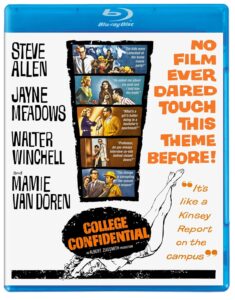 COLLEGE CONFIDENTIAL Blu-Ray (90 mins., 1960; Kino Lorber): Rarely revisited slice of dated late ‘50s/early ‘60s kitsch offers none other than the great talk show host Steve Allen as a college sociology professor whose latest study takes him to probe the lifestyles of those kooky young kids on campus at Collins College. Allen’s mistake is incorporating blatant questions about sex in his questionnaire, forcing reporter (and, of course, Allen’s wife) Jayne Meadows to look into his controversial study before falling for him. The “Guest Star” list counts Rocky Moarciano while Conway Twitty, Mickey Shaugnessy, Walter Winchell and Mamie Van Doren all spring up in this period affair which Allen disavowed despite being a producer on. Universal’s Blu-Ray includes a serviceable HD master (1.85 B&W) with David Del Valle and Stan Shaffer providing an audio commentary.
COLLEGE CONFIDENTIAL Blu-Ray (90 mins., 1960; Kino Lorber): Rarely revisited slice of dated late ‘50s/early ‘60s kitsch offers none other than the great talk show host Steve Allen as a college sociology professor whose latest study takes him to probe the lifestyles of those kooky young kids on campus at Collins College. Allen’s mistake is incorporating blatant questions about sex in his questionnaire, forcing reporter (and, of course, Allen’s wife) Jayne Meadows to look into his controversial study before falling for him. The “Guest Star” list counts Rocky Moarciano while Conway Twitty, Mickey Shaugnessy, Walter Winchell and Mamie Van Doren all spring up in this period affair which Allen disavowed despite being a producer on. Universal’s Blu-Ray includes a serviceable HD master (1.85 B&W) with David Del Valle and Stan Shaffer providing an audio commentary.
THE 10th VICTIM Blu-Ray (92 mins., 1965; Kino Lorber): Groovy mid ‘60s Italian sci-fi spoof stars a sultry Ursula Andress as a futuristic participant in a legalized murder game, “The Big Hunt,” that’s taken the post-WWIII world by storm. She spars with mark Marcello Mastroianni in a movie that fuses “Most Dangerous Game” elements with a prescient look at the mass media of the 21st century –all while retaining a very specific ‘60s vibe. Piero Piccioni scored this Carlo Ponti production, presented here in Studio Canal’s 2K restoration (1.85) with both English and Italian audio. Extras include a commentary by Howard S. Berger, Steve Mitchell and Nathaniel Thompson; a featurette by Roberta Licurgo on director Elio Petri, featuring Kim Newman along with the late director’s wife; and trailers.
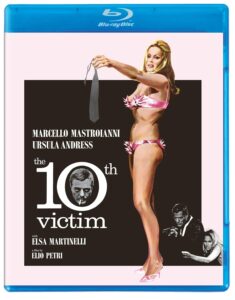 BLACK SHEEP 4K UHD (87 mins., 1996, PG-13; Kino Lorber): Second go-around for Chris Farley and David Spade, the SNL comedians who generated a solid hit with “Tommy Boy,” proved to be a big letdown, even with director Penelope Spheeris onboard, trying to reprise the magic of “Wayne’s World.” There’s no such luck in this labored farce, with Farley playing the hapless brother of gubernatorial candidate Tim Matheson, and Spade the campaign worker who agrees to keep Farley in-check – while finding out Matheson’s incumbent competition (Christine Ebersole, herself an SNL alumnus) is a crook. Strained slapstick adorns this troubled production which found Spheeris engaged in reported spats with both Spade and writer Fred Wolf; she’s on-hand here in a commentary with critic Simon Abrams while Kino Lorber’s UHD includes a fine Dolby Vision HDR (1.85) presentation with the trailer as an extra (there’s also a Blu-Ray from the same, 4K scan of the 35mm OCN included here).
BLACK SHEEP 4K UHD (87 mins., 1996, PG-13; Kino Lorber): Second go-around for Chris Farley and David Spade, the SNL comedians who generated a solid hit with “Tommy Boy,” proved to be a big letdown, even with director Penelope Spheeris onboard, trying to reprise the magic of “Wayne’s World.” There’s no such luck in this labored farce, with Farley playing the hapless brother of gubernatorial candidate Tim Matheson, and Spade the campaign worker who agrees to keep Farley in-check – while finding out Matheson’s incumbent competition (Christine Ebersole, herself an SNL alumnus) is a crook. Strained slapstick adorns this troubled production which found Spheeris engaged in reported spats with both Spade and writer Fred Wolf; she’s on-hand here in a commentary with critic Simon Abrams while Kino Lorber’s UHD includes a fine Dolby Vision HDR (1.85) presentation with the trailer as an extra (there’s also a Blu-Ray from the same, 4K scan of the 35mm OCN included here).
Speaking of TOMMY BOY (97 mins., 1995, PG-13; Paramount), that vastly superior first teaming of Chris Farley and David Spade is also newly remastered on 4K UHD from Paramount itself this month. Bonnie and Terry Turner’s script provides a more suitable comic scenario for the duo, with Farley the son of an auto parts mogul (Brian Dennehy) who inherits his father’s company and tries to keep it afloat with the help of lifelong pal Spade. Rob Lowe and Bo Derek pop up in this amiable SNL feature here remastered in Dolby Vision HDR (1.85, 5.1 TrueHD) with the accompanying Blu-Ray also featuring commentary from director Peter Segal, an array of deleted/extended scenes and archival featurettes. The limited Steelbook packaging also includes a Digital HD code.
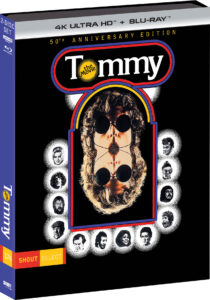 Also New on 4K UHD
Also New on 4K UHD
TOMMY 4K UHD/Blu-Ray (115 mins., 1975, R; Shout!): Spectacular sounding and looking UHD presents all of the glitz and gaudiness from this memorable (if incoherently daffy at times) adaptation of The Who’s rock opera, staged by director Ken Russell at the height of his cinematic talents.
It’s a period piece in every sense of the word, as the son (Roger Daltrey) of a conniving mother (Ann-Margret) and a lost WWII pilot ends up blind and deaf after she takes to a new husband in the form of Oliver Reed. From there, “Tommy” lives a wild existence encountering everything from a drug dealer (Tina Turner) to a Marilyn Monroe-worshipping cult and a “Pinball Wizard” in Elton John. Oh and there’s Jack Nicholson too!
“Tommy” works if you’re a fan of The Who or Russell, whose wacky visions meet the perfect source material here for his sensitivities. If you’re not into the music, though, a few minutes of this is likely to suffice, as it’s a polarizing viewing experience tonally and in nearly every sense.
Shout’s UHD, though, is a winner with its “Quintaphonic” soundtrack, presented in either 5.0 or 5.1 DTS MA (the latter being a little bit amplified) or a 2-channel offering much weaker than the other tracks. The Dolby Vision HDR (1.85) image is splendidly detailed and curated, but no extras are included.
WOLF MAN 4K UHD/Blu-Ray (103 mins., 2025, R; Universal): When writer-director Leigh Wannell modernized “The Invisible Man,” he produced a moderate hit for Universal, which had been stung by expensive franchise non-starters “The Mummy” and “Van Helsing,” two failed efforts to resurrect the studio’s classic monsters for a new generation. With producer Jason Blum once again behind him, Wannell now turns to another beloved monster – the Wolf Man – for a busted, depressing remake that should’ve been more accurately called “Hillbilly Zombie.”
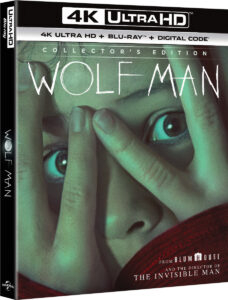 Light on thrills and suspense, but heavy on sadness, fractured relationships – and punctuated by some of the lamest creature design ever seen in a movie of this kind – Wannell’s “Wolf Man” at least starts off promisingly enough.
Light on thrills and suspense, but heavy on sadness, fractured relationships – and punctuated by some of the lamest creature design ever seen in a movie of this kind – Wannell’s “Wolf Man” at least starts off promisingly enough.
Off in the woods of Oregon, a father and son run into some kind of upright creature while they’re off deer hunting – decades later, the now-grown son (Christopher Abbott) returns with his workaholic wife (Julia Garner) and their young daughter (Matilda Firth) to the same, isolated ancestral home of his youth. Alas, they’re attacked en route by something resembling the same creature, with Abbott scratched and soon turning into an animal-like beast, while the other creature is out there lurking about, all of it causing terror for his understandably concerned wife and daughter.
At some point this “Wolf Man” was supposed to star Ryan Gosling but one wonders what kind of “scheduling conflict” eventually befell him en route to (wisely) dropping out of the project. Perhaps it was a failure to find a decent screenplay for a movie which essentially chucks all of the classic Wolfman mythology out the window – you can forget about any fanciful back story for the werewolf curse, wild gypsies running about or even the Wolfman having the ability to shapeshift whenever a full moon isn’t around. Once you get attacked, you’re here turned into some weird looking, Dr. Moreau-created beast with no hope of coming back – at least, that’s the best I can say for the picture’s hideously unappealing make-up and creature effects that nearly look like your friend’s pathetic attempt to go all Lon Chaney, Jr. back in the ‘70s without the means to pull off the look.
Stripped of all of those interesting elements that define the character as more than just a violent killer, this “Wolf Man” is a remarkably thin movie that has nowhere to go but down, and its stiflingly downbeat trajectory makes the whole enterprise a predictable, tiresome affair. Almost nothing turns out to be compelling here – not Abbott’s transformation, not Garner’s move from an urban workaholic to a resourceful mom, and certainly not the poorly staged and executed set-pieces. There’s no life to this movie at all, and since the picture abandons not just its genre heritage but any hope of adding twists or turns involving its “backwoods curse” – which turns out to be more a disease than anything else – there’s nothing to latch onto as this dreary slog rolls towards its preordained ending.
The lack of supporting players also forces Wannell to rely entirely on his three leads, and it’s a losing struggle despite the actors trying hard. Abbott manages to establish a rapport with the girl but there’s not much chemistry happening between him and Garner, who seems to be straining here to play a straight role without the “colorful” elements of her personality that have informed her past performances. You also never buy her recapturing her feelings for her husband as he undergoes a transformation that almost seems to be echoing David Cronenberg’s “The Fly” but comes off falling far short of that mark – just as it does even the troubled but superior 2010 “Wolfman” Universal rolled out with Benicio Del Toro that, at least, looked the part and adhered much closer to the character’s roots.
This is a howler of the wrong kind, a concept misguided from the get-go that proves there’s no breaking the curse of bad moviemaking.
Universal’s 4K UHD (2.39, Dolby Atmos) looks fine with HDR10 grading and has a nicely mixed Dolby Atmos soundtrack. In addition to the Blu-Ray and a Digital HD code, “Wolf Man” includes commentary from Wannell and about a half-hour of featurettes.
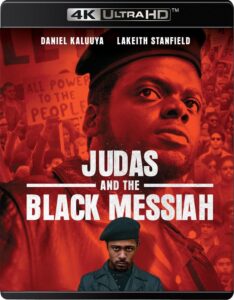 PADDINGTON 2 4K UHD (104 mins., 2018, PG; Warner): Sequel to the 2014 UK hit – which performed well at the U.S. box-office – met with decidedly lower receipts domestically. However, this amiable follow up offers more of the same, mostly gentle entertainment for kids, with Paddington having acclimated himself to domestic life with the Brown family – at least until he’s framed for stealing a pop-up book and goes to prison. Fortunately, the resourceful bear created by Michael Bond is able to work his magic and breaks out, ultimately going after the real culprit (a narcissistic actor played by Hugh Grant) with the help of his adoptive family. Paul King directed and co-wrote “Paddington 2,” which finds the original cast (Hugh Bonneville, Sally Hawkins, Ben Whishaw as the voice of Paddington) back and most of the colorful action retaining the slapstick shenanigans of its predecessor. I still found most of this a bit overlong and some of the humor predominantly British in its sensibility, perhaps why the sequel didn’t meet expectations stateside. Warner’s 4K UHD (2.39) sports an attractive Dolby Vision HDR transfer and Dolby Atmos sound.
PADDINGTON 2 4K UHD (104 mins., 2018, PG; Warner): Sequel to the 2014 UK hit – which performed well at the U.S. box-office – met with decidedly lower receipts domestically. However, this amiable follow up offers more of the same, mostly gentle entertainment for kids, with Paddington having acclimated himself to domestic life with the Brown family – at least until he’s framed for stealing a pop-up book and goes to prison. Fortunately, the resourceful bear created by Michael Bond is able to work his magic and breaks out, ultimately going after the real culprit (a narcissistic actor played by Hugh Grant) with the help of his adoptive family. Paul King directed and co-wrote “Paddington 2,” which finds the original cast (Hugh Bonneville, Sally Hawkins, Ben Whishaw as the voice of Paddington) back and most of the colorful action retaining the slapstick shenanigans of its predecessor. I still found most of this a bit overlong and some of the humor predominantly British in its sensibility, perhaps why the sequel didn’t meet expectations stateside. Warner’s 4K UHD (2.39) sports an attractive Dolby Vision HDR transfer and Dolby Atmos sound.
Solid performances abound in the Ryan Coogler-produced drama JUDAS AND THE BLACK MESSIAH (126 mins., 2020, R; Warner), the story of an FBI informant (LaKeith Stanfield) who faces a tough choice after he infiltrates the Black Panthers and their leader Fred Hampton (Daniel Kaluuya), at the behest of Hoover’s FBI. Director Shaka King’s film is textured with strong sequences in a screenplay written by King and Will Berson, and is finely acted by both leads. Warner’s 4K UHD premieres this month with Dolby Vision HDR and Dolby Atmos sound, along with two featurettes.
SHAMELESS: The Complete Series DVD (2011-21; Warner): The trials and tribulations of the Gallagher clan were chronicled in the long-running Showtime series starring William H. Macy and an ensemble cast, led by Emmy Rossum, that generated big laughs with a dose of drama to match. Set on Chicago’s south side, Frank (Macy) is a bit of a louse whose kids often fend for themselves, which they do in a raunchy, flavorful show which generated a solid amount of fans throughout its nearly decade-long run. All of its episodes have been collected here on DVD by Warner with 16:9 transfers, 5.1 soundtracks, featurettes, commentaries, unaired scenes, a music video, and other extras from its assorted season releases (check out the Archives pages for those individual reviews when I ran them).
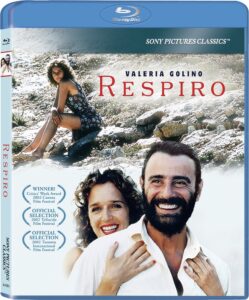 New From Sony: A pair of Sony Pictures Classics titles are new on Blu-Ray this month.
New From Sony: A pair of Sony Pictures Classics titles are new on Blu-Ray this month.
Gorgeous locales, and the lovely Valeria Golino, are reasons to check out Emanuele Ciralese’s 2002 film RESPIRO (95 mins., PG-13). Golino plays a mother of three whose free-spirited tendencies both enchant and occasionally enrage her friends and family, including husband Vincenzo Amato, in a flavorful character study set on the Mediterranean island of Lampedusa. Sony’s Blu-Ray (1.85) includes a lovely 1080p transfer with 5.1 DTS MA sound…Mike Van Diem’s CHARACTER (125 mins., 1997, R) won the Best Foreign Language film at the ‘98 Oscars and comes to Blu-Ray from Sony. Van Diem’s acclaimed adaptation of a popular Dutch novel is set in Rotterdam during the 1920s, and Sony’s Blu-Ray offers a high bit-rate 1080p (1.66) transfer with Dutch 5.1 DTS MA audio and English subtitles.
NEXT TIME: OCN Wrap and Criterion 4Ks! Until then, don’t forget to drop in on the official Aisle Seat Message Boards and direct any emails to our email address. Cheers everyone!
